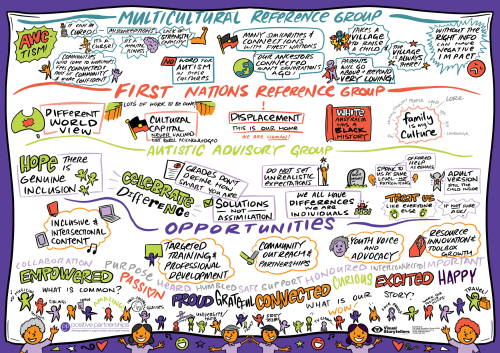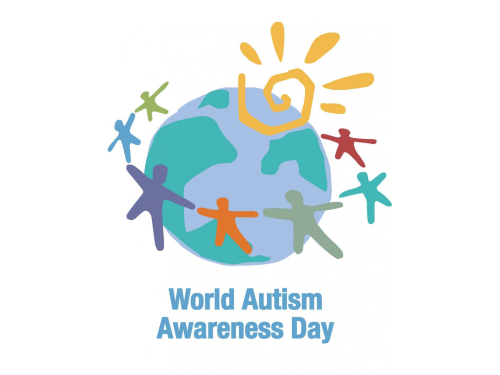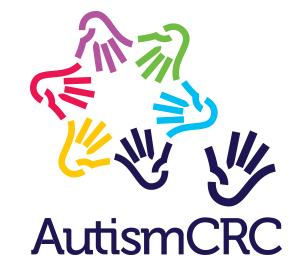In May, we invited members of three groups that support the work we do to come together with Positive Partnerships staff to learn and share. It was the first time that our First Nations Reference Group, Autism Advisory Group and Multicultural Collaboration Group met together in person and had the opportunity to work alongside each other.
Below is a video clip that summarises the important work and perspective these groups bring to the work of Positive Partnerships.
Craig Smith (00:16):
It is the first time we've brought everyone together who works for us with Positive Partnerships, our First Nations Reference Group, our Autistic Advisory Group, and our Multicultural Collaboration Group. We work virtually together. We've never had a chance to all be in the same room collaborating and working together. It's really important for us to stay on the front foot with what's happening in the autism space and the education space. We want to make sure that the conversations we're having here contribute to the outcomes of autistic students all across the country.
Nathan Watts (00:48):
Dear young Nathan, boy, do I have a lot to share with you. I know it feels weird spending half your Mondays getting OT, speech therapy, and physio, but it all pays off at the end.
Ana Palacios (00:59):
Bringing lived experience voices across particularly all of our reference groups and bringing us together is such an exciting idea because there is cultural exchange happening on multiple levels. There is autistic culture, there is many other cultures in our space, and when we say what we need and what will help and to be able to bring that understanding and knowledge into the school sphere, where I admit I did not have the greatest time, is the opportunity to prevent some of the difficulties and harms myself and other older autistic generations have experienced over the years.
Jarad McLoughlin (01:34):
I didn't know how my teachers or principals or anyone would respond or react to me if I was to stim or to have a breakdown or a meltdown. I got told off, I was scrutinized, and many occasions I had to go to time out or I do remember one moment I had to go into the storeroom where there were no windows, and that's pretty much where I had to spend to calm down.
Geraldine Robertson (02:07):
People don't often think about autistic adults becoming teachers. I always disclose that I'm autistic because I find that people realize anyway from my behaviors. And as far as working goes for children, that's amazing because the children who have a diagnosis, often they've never met an adult who is the same as them, and to be able to say, "Oh, she understands," or it's that me too moment for them quite often, which is really special and helps them develop a sense of who they are.
Craig Smith (02:40):
The value and the impact for us is being able to share evidence-based practices with all of our network here, and knowing that that will go back into community, go all around Australia, go into schools, families, and the difference that makes to our autistic students is immense.
Lauren Cheng (02:58):
Part of our role is to adapt the autism information that is evidence-based back to our own culture because a lot of the multicultural communities have a very old understanding about autism and disability in general. So our work is important because we are bringing renewed understanding about autism to shift their mindset, so that in some ways the parents understand their children better. They're seeing the children through a renewed lens, and doing so, we believe that it will also improve the parent-child relationship.
Jay Morton (03:36):
I think a big thing has been removing some of that stigma and shame. So I think my journey with Positive Partnerships has helped me to be a bit more confident in myself as a First Nations autistic person. My hope is that when my children are my age, that there's not that same stigma or misunderstanding in their communities.
Craig Smith (03:58):
What we hear at events like this is just how much more there is to do in the future. We know there's more conversations to have, more resources to create, and we want to see that impact in our schools all around Australia.
Yuho Okita (04:10):
This unique workshop get opportunity to, for us to learn the branded information of both evidence and legal experience.
Nathan Watts (04:20):
When you changed schools, you were worried about making friends because it's always been a struggle, but you've built many lasting friendships, some that have lasted since primary school. You've fallen in love and you're happily on your way to being married in the future.
Geraldine Robertson (04:37):
I don't know any other body in Australia that honors autistic people in the way that Positive Partnerships does. It's a very powerful link between what the teachers do and what the children need if they're able to take that learning back into classrooms.
Jarad McLoughlin (04:54):
And you will be scared, you will be afraid, and you may feel isolated and alone, but just know that when you become an adult and there is a teacher that you are able to look up to, just remember them and you'll be able to get through anything.
We had a visual storyteller at the event to capture conversations and insights. This colourful diagram reflects some of the wonderful interactions that took place.








